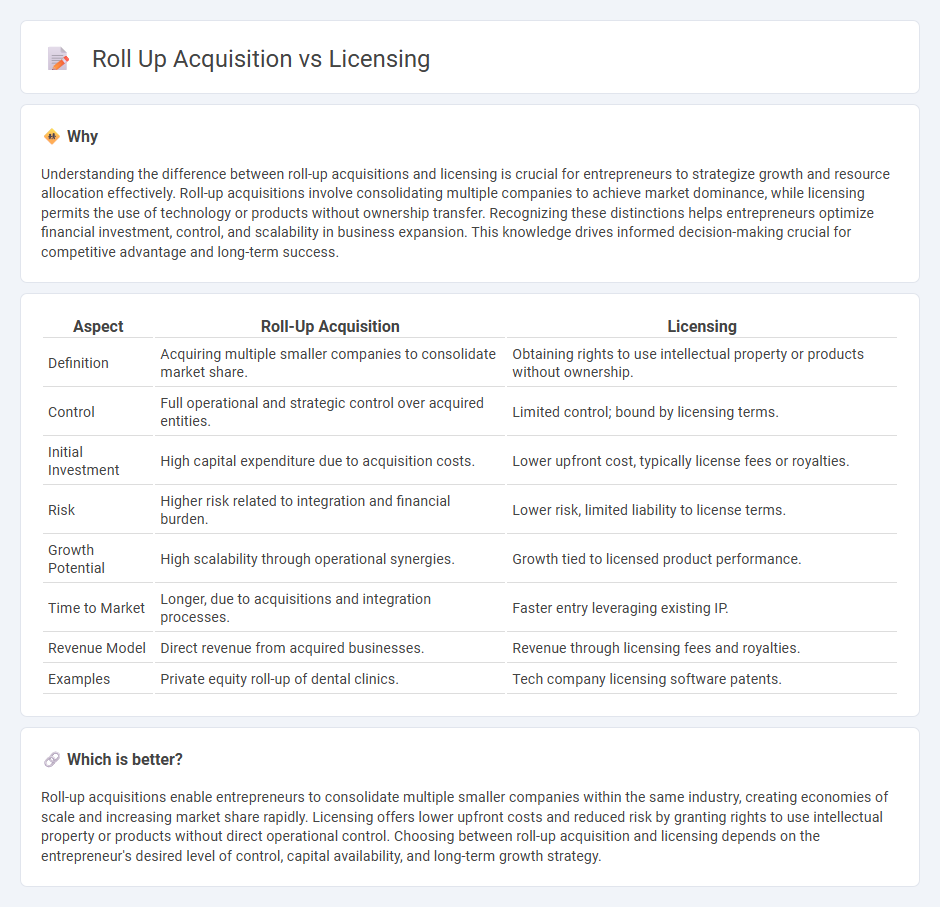
Roll-up acquisitions consolidate multiple smaller companies in a market to create economies of scale and enhance competitive advantage, often accelerating growth and market share expansion. Licensing grants permission to use intellectual property or products, enabling market entry with lower upfront investment and reduced operational risk. Explore the strategic benefits and challenges of roll-up acquisition versus licensing to determine the best entrepreneurial approach for your business goals.
Why it is important
Understanding the difference between roll-up acquisitions and licensing is crucial for entrepreneurs to strategize growth and resource allocation effectively. Roll-up acquisitions involve consolidating multiple companies to achieve market dominance, while licensing permits the use of technology or products without ownership transfer. Recognizing these distinctions helps entrepreneurs optimize financial investment, control, and scalability in business expansion. This knowledge drives informed decision-making crucial for competitive advantage and long-term success.
Comparison Table
| Aspect | Roll-Up Acquisition | Licensing |
|---|---|---|
| Definition | Acquiring multiple smaller companies to consolidate market share. | Obtaining rights to use intellectual property or products without ownership. |
| Control | Full operational and strategic control over acquired entities. | Limited control; bound by licensing terms. |
| Initial Investment | High capital expenditure due to acquisition costs. | Lower upfront cost, typically license fees or royalties. |
| Risk | Higher risk related to integration and financial burden. | Lower risk, limited liability to license terms. |
| Growth Potential | High scalability through operational synergies. | Growth tied to licensed product performance. |
| Time to Market | Longer, due to acquisitions and integration processes. | Faster entry leveraging existing IP. |
| Revenue Model | Direct revenue from acquired businesses. | Revenue through licensing fees and royalties. |
| Examples | Private equity roll-up of dental clinics. | Tech company licensing software patents. |
Which is better?
Roll-up acquisitions enable entrepreneurs to consolidate multiple smaller companies within the same industry, creating economies of scale and increasing market share rapidly. Licensing offers lower upfront costs and reduced risk by granting rights to use intellectual property or products without direct operational control. Choosing between roll-up acquisition and licensing depends on the entrepreneur's desired level of control, capital availability, and long-term growth strategy.
Connection
Roll-up acquisitions and licensing intersect as strategic tools for entrepreneurs to scale businesses rapidly while minimizing risks. By acquiring multiple smaller companies, entrepreneurs achieve economies of scale, and licensing agreements enable access to proprietary technologies or brands without heavy capital investment. This synergy enhances market penetration, accelerates innovation, and maximizes revenue streams in competitive industries.
Key Terms
Intellectual Property
Licensing intellectual property allows companies to leverage existing patents, trademarks, or copyrights without the need for full ownership, thereby reducing upfront costs and risks. Roll up acquisitions consolidate multiple intellectual property assets under one entity, enabling enhanced control, comprehensive portfolio management, and potentially greater market influence. Explore the strategic advantages and challenges of each approach to optimize your intellectual property management.
Consolidation
Licensing agreements allow companies to leverage existing intellectual property without ownership transfer, facilitating market entry with lower risk. Roll-up acquisitions consolidate multiple firms under a single ownership, enhancing market share, operational efficiency, and competitive positioning. Discover the strategic benefits and challenges of these consolidation approaches to optimize your business growth.
Strategic Synergy
Licensing agreements enable companies to leverage intellectual property and access new markets with lower upfront costs, fostering strategic synergy through shared innovation and risk mitigation. Roll-up acquisitions consolidate multiple firms in the same industry, creating operational efficiencies, expanded market share, and stronger competitive positioning to maximize value. Explore more to understand how each approach drives strategic synergy and shapes business growth.
Source and External Links
What is Licensing | Licensing International - Licensing is an agreement where a licensee leases rights to intellectual property from a licensor for use with products or services, widely used in fields like entertainment, sports, and fashion, among others.
Licensing | Federal Communications Commission - The FCC manages and licenses the electromagnetic spectrum for commercial and non-commercial users, requiring registration through its CORES system to conduct business with the commission.
Licensing Overview - U.S. Copyright Office - The U.S. Copyright Office Licensing Section manages compulsory and statutory licenses under copyright law and requires electronic filing for certain statements and payments, aiming for efficient royalty administration.
 dowidth.com
dowidth.com